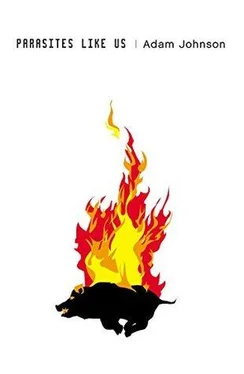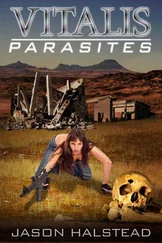With the pick, I scraped snow away from the little plant until I found frozen soil. I began chipping at the earth, breaking a little dirt loose with each stroke.
“You gonna help or what?” I asked Vadim.
“This isn’t going to work,” he said. He stood there, watching me dig. “She will not be impressed by this weed.”
It was pretty hard not to hurt the roots in the frozen dirt, but I did my best. The plant smelled good on my hands, and I’ve always liked the shape of those little blue berries.
Vadim wouldn’t let up. “What makes you think she will like that plant? There are a million plants just like it. What makes you think that one is special?”
I just kept digging. When my face started to shine, Vadim joined me, and soon we had a passable hole. Soon we had a plant in a bucket. I looked at that hole. It was a good spot we were at. I didn’t quite understand Vadim’s resistance, but we’d turned our first corner here. I pulled out my GPS unit. I wrapped it in the buckskin I’d used for Keno’s point, and together Vadim and I buried the thing. If this story has reached you, fellow humans of the future, then you have no doubt found this and all the other artifacts I have left for you. Perhaps some sort of historical marker now stands where Vadim and I stood that morning. Perhaps such monuments to our deeds litter the landscape from here to Asia.
Certainly, of course, there will be those in the future who have found a way to hold me responsible for the very calamity that we here survived. I trust the thinking persons among you know foolishness when you hear it. Always there are lesser scientists who, for lack of a good dissertation topic, will spend several years researching such cockamamie ideas. Their goal is not truth but celebrity, and their means are incendiary sensationalism. I’ve said enough on the topic already; suffice it to say that, over the last million years, the fates of the cultures of the world have always been the same: dust. Anthropologists don’t erase cultures; we remember them.
Other decisions, I’m sure, will fall under some scrutiny. In teaching Gerry’s kids, a duty that fell solely to me during their long march toward doctoral degrees, I instructed them in Latin at the expense of Greek. I perhaps overstressed the Enlightenment, and I confess that I pretended the entire twentieth century didn’t occur. As to my rendition of feminism, I tried my best. Vadim was to outclass all students before him, earning his Ph.D. in record time, and when his thirst turned from humanism to popular culture, I readily admit the inaccuracies I may have passed on in my depiction of the movies, songs, and literature of the day.
That bank of clouds was still gnurling its way across the horizon. They looked like glaciers to me, slow, determined, unearthing everything buried before them.
“So how long does she usually stay in the cellar?”
Vadim shrugged. He’d been doing fine while occupied with digging, but now fear again gripped him, and he looked down upon the town with weary eyes.
I said, “I’m going to say a couple things to you, all right?”
Vadim looked at me. He nodded.
“All those dead people in the streets,” I said, “they’re not people anymore, so don’t be afraid of them. Their spirits have gone someplace else. I haven’t figured out where yet, but I’ve been doing a lot of thinking on it. Your father is probably with the spirits. We won’t know for sure until we get to Vlotovnya.”
Vadim looked past me, to the town and hog fields beyond. He was still listening, though.
“These are only words to you now,” I told him. “It will take your whole life to understand what it means to lose your father. Someday, though, I’ll teach you how to tell his story. In the future, I believe everyone’s story will be told. Right now, it’s not possible. For now, all we can do is tell one story that has a part of everybody.”
I indicated the cloud front on the horizon, pointing to the sooty wisp of its leading edge, as well as the ice-blue within. “I will never leave you,” I told Vadim, “though everyone’s time must come. When mine comes, you can look at a cloud like this, and you will feel me there. I’ll leave a part of myself there for you.”
I stood. The cold air was sharp against my ribs, but the sun was really something off the snow. You could about see forever. It’s funny — I’d always pondered what had made the Clovis leave their homes and ancestors to make their crazy journey, but it had never occurred to me how they must have felt when they got there. They’d risked everything, and suddenly, emerging from the ice, they discovered a new world, a continent that was entirely unpeopled. What ran through their veins when they were confronted with such a possibility? What first words did they speak when they stared into a land that knew not their echo?
That morning, with my hand on Vadim’s shoulder, I felt I knew.
“Come on,” I told him. “Its time to get your mother out of the cellar.”
We turned from the depopulated plains of North America. We weren’t going to found an empire here. We had other plans, ones that included Canada, Alaska, the Bering Sea, and the Kamchatka Peninsula. We were headed to Okinawa next. My life’s work had yet to begin, and the journey ahead would shuttle us off this continent by the same route that had brought the Clovis, thus concluding humanity’s twelve-thousand-year camp-out in North America. The trip wouldn’t be so hard. We’d taught a thousand students how it went. It was a story we knew by heart.
The author wishes to thank the entire Harrell family, without whose generosity and tireless support this book could not have been finished. Specifically, I am indebted to Dr. James Harrell, the Honorable Gayle Harrell, Jennifer Sobanet, and Melinda Johnson; and nothing is possible without my wife, Stephanie Harrell — you are my perpetual orbit, my flight, my fuel, my gravity.












